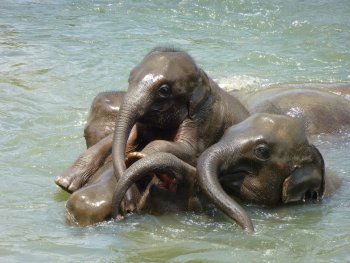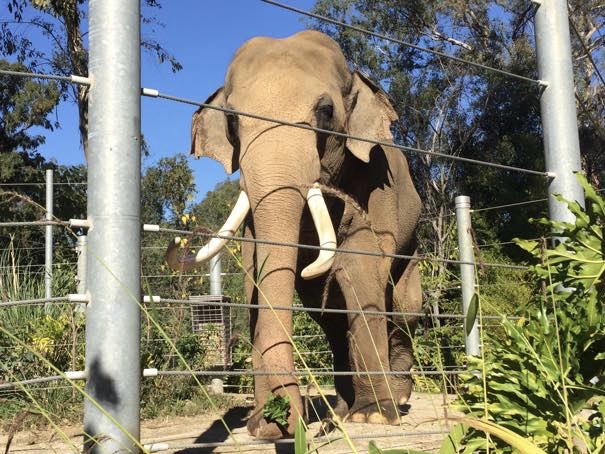
 Executive Director Gay Bradshaw is interviewed for a recent article of National Geographic, Elephant orphans face added challenge: bullying. She discusses how all Wildlife studies must be trauma-informed, understand that these individuals and communities have sustained successive traumas.
Executive Director Gay Bradshaw is interviewed for a recent article of National Geographic, Elephant orphans face added challenge: bullying. She discusses how all Wildlife studies must be trauma-informed, understand that these individuals and communities have sustained successive traumas.


Using the combined lenses of natural history, neuroscience, and psychology, G. A. Bradshaw describes how predators share the rainbow of emotions that humans experience, including psychological trauma. By exploring their inner lives, this pioneering book refutes the many misperceptions that hide the true nature of these animals. We discover that great white sharks express tender maternal feelings, rattlesnakes make friends, orcas abide by an ancient moral code, and much more.
“This may be the most exciting, most informative, and most surprising book ever written about animals. It results from a new approach to animal studies, and the findings are overwhelming.”—Elizabeth Marshall Thomas, author of The Hidden Life of Dogs
“Carnivore Minds is a pure delight and a magnificent achievement. Think of it as Darwin’s The Expression of the Emotions in Man and Animals for the twenty-first century. Every page reveals a new idea for looking deeply into animal souls.”—Jeffrey Moussaieff Masson, author of Beasts: What Animals Can Teach Us About the Origins of Good and Evil
An excellent book. The descriptions of animal behaviour are rich and vibrant. The information it collates from a wide variety of sources. . . is always interesting and enthralling. . . There is much that is important and entertaining in this book.”—Mark Rowlands, Times Literary Supplement
“Gripping…Gay Bradshaw informs, educates, challenges, and exposes biases about carnivores. We need to stop excluding these animals from the ambit of human ethical concern.”—John Gluck, author of Voracious Science and Vulnerable Animals: A Primate Scientist’s Ethical Journey
“The book forces us to regard other species—those dangerous, frightening, predatory ones that occasionally kill us—in a new light.” –Luke Hunter, Panthera
“A powerful argument.”—Natural History
“Gripping…Gay Bradshaw informs, educates, challenges, and exposes biases about carnivores. We need to stop excluding these animals from the ambit of human ethical concern.”—John Gluck, author of Voracious Science and Vulnerable Animals: A Primate Scientist’s Ethical Journey
“The Western world has long kept non-humans in conceptual boxes, distanced from the rest of the living world. Gay Bradshaw does the opposite. By removing artificial dividers, she shows the overlapping abilities and experiences among species and illuminates new perspectives for us to consider.”—Carl Safina, Beyond Words: What Animals Think and Feel
“Carnivore Minds establishes a sense of urgency to conserve, protect, and respect carnivores by raising important ethical concerns about current wildlife practices . . . a terrific read for anyone curious about understanding or appreciating the mental processes of carnivores specifically and nonhuman animals in general.”—Jennifer E. Smith, Quarterly Review of Biology
“[A] fascinating blend of well-informed anecdote, neuroscience, ecology, and gleanings from the scientific literature.”—Booklist
“The book is intended for a broad audience of readers of popular science and academics alike, and the wonderful narrative style will appeal to readers of all types . . . [Bradshaw’s] storytelling ability and the structure of the book around personal stories, and of course the content itself, make this book a fascinating read.”—Michael M. Lacy, Yale Journal of Biology and Medicine
“Bradshaw continues to carve out an immensely important and innovative field that combines animal behavior and psychology, with deep inter-mind—and soul—sensibilities. Beautifully written. This book is a catalyst for societal change.”–Peter H. Kahn, Jr., University of Washington
“With panache and care, Gay Bradshaw tackles myths about carnivores. She moves the reader to greater understanding and empathy—critical tasks if we are going to increase humanity’s concern for carnivore thriving.” –Darcia Narvaez, University of Notre Dame
“The book forces us to regard other species—those dangerous, frightening, predatory ones that occasionally kill us—in a new light.” –Luke Hunter, Panthera
“Bradshaw goes beyond current trends, uniting two seemingly unrelated fields of science into one: neuropsychology and carnivore biology. She makes a remarkably original contribution by taking the reader into psychological sessions with an interesting cast of charismatic carnivores.”—William J. Ripple, Oregon State University
“The latest and most persuasive in a small croop of 21st-century nature books whose aim is to remove simple villians from the animal kingdom . . . Here’s hoping this and all such books aren’t too late.”—Open Letters Monthly
“Well-researched . . . Readers will find descriptions of coming eye-to-eye with white sharks and up-close-and-personal encounters with grizzly bears and other large carnivores particularly compelling.”—Choice

Read Our Common Blood, a review by Gay Bradshaw of the book, Wolf Nation: the Life, Death, and Return of Wild American Wolves (Brenda Peterson).

While the world’s attention has understandably been focused on the Trump Administration recently lifting the ban on the importation of wild animal “trophies” from Africa into the U.S., a group of dedicated animal advocates are helping to save hundreds of elephants that are suffering in North American zoos. One of the most noted is Billy The Elephant, who has been held captive in the Los Angeles Zoo since 1989.





